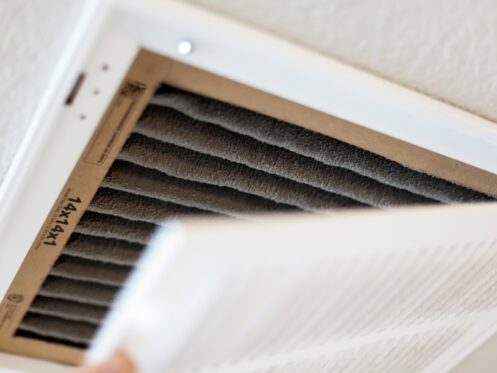Your HVAC system is one of the most important tools at your disposal for keeping the air in your home comfortable. To make the most of this essential tool, you must remember to keep its filters clean and effective. In what follows, we’ll give you all the details about how often and in what way to change your HVAC system’s filters so you can keep up with your furnace and AC maintenance.
The Most General Rule
If you ask how often you should change your HVAC filters, you’ll almost always hear that you should do so roughly every one to three months. While there’s nothing wrong with this general reply, it ignores many caveats and leaves out a great deal of important context. In what follows, we’re going to supply some of that additional information.
System Type
Filter replacement schedules can vary among the different types of HVAC systems. The 30-to-90-day rule is a good jumping-off point for most kinds of systems, but it doesn’t apply to ductless mini-split systems. If you have any type of mini-split system at home, you should probably clean its filters approximately once every two weeks.
We should emphasize that mini-split systems use filters that are washable and reusable, but other types of HVAC systems generally don’t. Therefore, if you have a ductless HVAC system, you’ll be able to wash its filters every two weeks and put them back to use, though their overall service lives can vary. We’ll discuss more about filter types below.
Filter Type
To get a clear idea of how HVAC filters work, you must evaluate both their power and the materials that compose them. Each of these attributes has implications for how you should treat your filters.
First, you must understand what a MERV, or Minimum Efficiency Reporting Value, is. This is a metric that, on a scale of 1 to 20, determines the strength of your filter, with higher ratings indicating more power.
Each filter will be able to remove a given percentage of particles from the air that are of a particular diameter or smaller. To be more specific, filters with high MERVs will be able to trap greater proportions of lower-diameter particles than filters with low MERVs will.
The most common HVAC filter materials are fiberglass, cotton and polyester. You may also have special HEPA and ULPA filters, though, if you do, they’ll almost certainly sit inside devices like air purifiers.
Fiberglass filters will usually have MERVs between 2 and 5. Pleated filters, which use cotton or polyester in their meshes, typically have MERVs of 8 or higher. HEPA filters will have MERVs of at least 17, while ULPA filters all have MERVs of 20.
Since more powerful filters pull more pollutants out of the air than weaker ones do, you may realize that you’ll need to replace stronger filters more often. While this rationale is generally sound, more powerful filters are also thicker, which allows them to last longer. Therefore, you may need to replace fiberglass filters every 30 days, but certain kinds of pleated filters may be able to function effectively for 90 days or more.
A HEPA filter can last for anywhere between six and 12 months, while an ULPA filter may remain effective for as long as three years. You almost certainly will not need to have such powerful filters in your system, however. In fact, HVAC industry professionals typically recommend not outfitting your HVAC system with filters that have MERVs greater than 13 because especially strong filters can choke off airflow.
Pets
Because they can pose a significant threat to your home’s indoor air quality (IAQ), pets can also greatly increase the stress that weighs down on your HVAC system. If you don’t have any furry pets at home, what we’ll say here won’t really apply to you. If you do, however, you’ll need to adjust your attitude toward your HVAC system and its filters.
Animals like dogs, cats, rabbits and hamsters will shed their hair and dander throughout your home. As your HVAC system’s fans push and circulate the surrounding air, at least some of this hair and dander will end up on your filters. The same is true of the bits of dirt and pollen that your pets may carry into your home or even the droppings that they may leave lying around there.
In short, if you have furry pets, you’ll almost certainly need to clean or replace your filters more often than the general rule we gave above suggests. The additional welter of pollutants that pets often carry in their wake makes this inevitable. Of course, to minimize the strain on the filters, you should also wash and groom your pets regularly.
Household Conditions
HVAC filters don’t operate in a vacuum. The practices that you adopt while at home and the general conditions that prevail there can decide quite a bit. With good habits and a clean environment, your filters will almost certainly be able to serve you for longer periods.
For instance, the overall IAQ in your home is always a critical factor. The higher your IAQ already is, the longer your filters will probably last. Therefore, we encourage you to stop doing things that decrease your IAQ and start doing things that promote it.
This should give you one more reason never to smoke indoors. If you happen to enjoy cooking, what we’ve said should also encourage you to be more careful. If stressors like these exist in your home, you’ll almost surely need to change your filters more frequently than a mere look at their type and quality would indicate.
We strongly advise you to purchase some IAQ-improving tools, like an air purifier or an air scrubber. It would also probably be a good idea to air out your home every so often by opening up your windows and doors, though the wisdom of this course of action will depend on whether pollen, dust or other debris is floating around outside.
Furthermore, we strongly recommend doing whatever you can to promote ventilation in your home, even if the air around you is already clean. If you have a traditional HVAC system that uses ductwork, make sure that your ducts have neither a single hole nor a speck of debris in them. Neglecting these things could end up either inadvertently introducing pollutants into your home or making it harder for your system to remove them, which, in both cases, would put additional pressure on your filters.
Finally, to maximize the longevity and usefulness of your HVAC filters, we urge you to schedule regular professional-grade maintenance for your entire HVAC system. During tune-ups, technicians can remove debris from other parts of your system, thus improving its overall functionality, promoting airflow and thereby easing the burden on your filters. Ideally, your system should receive maintenance either once or twice per year.
Maintaining clean and powerful filters is only one part of what it takes to keep your HVAC system in effective shape. The system will also require periodic repair and maintenance services. You can join our Comfort Club Program to get maintenance reminders, discounts, and other money-saving perks.
To enjoy a wide range of top-notch HVAC services in the vicinity of Zebulon, NC, call Landen Heating and Cooling today.


